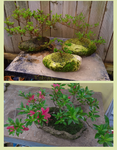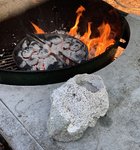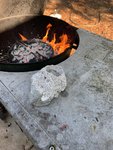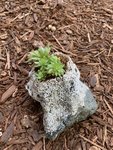You are using an out of date browser. It may not display this or other websites correctly.
You should upgrade or use an alternative browser.
You should upgrade or use an alternative browser.
Organogenic Bonsai Pot
- Thread starter NOZZLE HEAD
- Start date
fredman
Masterpiece
Ha, I like out the box pots. This is a beauty.
I used to hollow out pumice blocks and put azaleas in it.

Problem as you say comes repot time. The roots grows into the cavities and you have to risk breaking things to get it out of there.
I don't have many ideas for your one...maybe a cork bark jade...
I used to hollow out pumice blocks and put azaleas in it.

Problem as you say comes repot time. The roots grows into the cavities and you have to risk breaking things to get it out of there.
I don't have many ideas for your one...maybe a cork bark jade...
Forsoothe!
Imperial Masterpiece
So call it a temporary pot that you will break one day when you need to repot. If you can't use it because you don't want to break it, what's it good for? Get some use out of it and go on from there.
Last edited:
penumbra
Imperial Masterpiece
Definitely consider a dwarf plant and also the pH preference. I imagine the pH of your proposed planting vessel is about 8.
A succulent should do quite nicely. Some of my dwarf euphorbia and other succulents grow less than an inch a year.
A succulent should do quite nicely. Some of my dwarf euphorbia and other succulents grow less than an inch a year.
DBPooper
Yamadori
Carve out the inside to make it more pot like (slight taper, easier to repot) keeping the rim and outside because it's natural and awesome looking, drill drainage and tie down holes, fill and seal (cement patch possibly).
rodeolthr
Shohin
NOZZLE HEAD
Shohin
Carve out the inside to make it more pot like (slight taper, easier to repot) keeping the rim and outside because it's natural and awesome looking, drill drainage and tie down holes, fill and seal (cement patch possibly).
It is quite porous and has a 3/8” hole at the low point, so I’m good for drainage.
The rock it is grew on is basalt and I don’t want to drill through it.
NOZZLE HEAD
Shohin
I have a coupe of pumice containers as well, I only use them for accent plants.Ha, I like out the box pots. This is a beauty.
I used to hollow out pumice blocks and put azaleas in it.
View attachment 313495
Problem as you say comes repot time. The roots grows into the cavities and you have to risk breaking things to get it out of there.
I don't have many ideas for your one...maybe a cork bark jade...
NOZZLE HEAD
Shohin
Definitely consider a dwarf plant and also the pH preference. I imagine the pH of your proposed planting vessel is about 8.
A succulent should do quite nicely. Some of my dwarf euphorbia and other succulents grow less than an inch a year.
Attachments
ShadyStump
Imperial Masterpiece
You might just plant whatever you want to grow in a smaller pot that can fit hidden inside your barnacle. A little waterproofing/sealant agent on the barnacle itself might also help protect it if you do plant directly in it.
Leo in N E Illinois
The Professor
- Messages
- 11,373
- Reaction score
- 23,377
- USDA Zone
- 5b
A number of North American native junipers do well on alkaline soils.
Bittersweet vine, Cladrastis, likes alkaline soils.
I would need to hit the books, but there are a number of pines that do well on alkaline soils. Also trees listed as salt tolerant tend to do fine on alkaline soils.
Maidenhair fern does well on limestone soils.
If you use an entirely inorganic mix, What ever you plant in there can get root bound ans survive for quite a long time.
Bittersweet vine, Cladrastis, likes alkaline soils.
I would need to hit the books, but there are a number of pines that do well on alkaline soils. Also trees listed as salt tolerant tend to do fine on alkaline soils.
Maidenhair fern does well on limestone soils.
If you use an entirely inorganic mix, What ever you plant in there can get root bound ans survive for quite a long time.
Rivka
Shohin
I would take the largest container you can get to slip into it properly and then use that to be the internal form for a concrete casting. Basicly filling the internal space between the natural stone and a eventually removable liner pot. Then you can always work a tree in the liner, repotting and root trimming when needed and slip it back into its nice home when done
LittleDingus
Omono
I'm late to the party, but I use cypress knees as pots sometimes. Same root issue plus eventual rot issues. There are spray rubbers (look for leak seal) that can fill the cavities and prevent roots from entering. Epoxy works well too.
Similar threads
- Replies
- 2
- Views
- 23
- Replies
- 2
- Views
- 170



